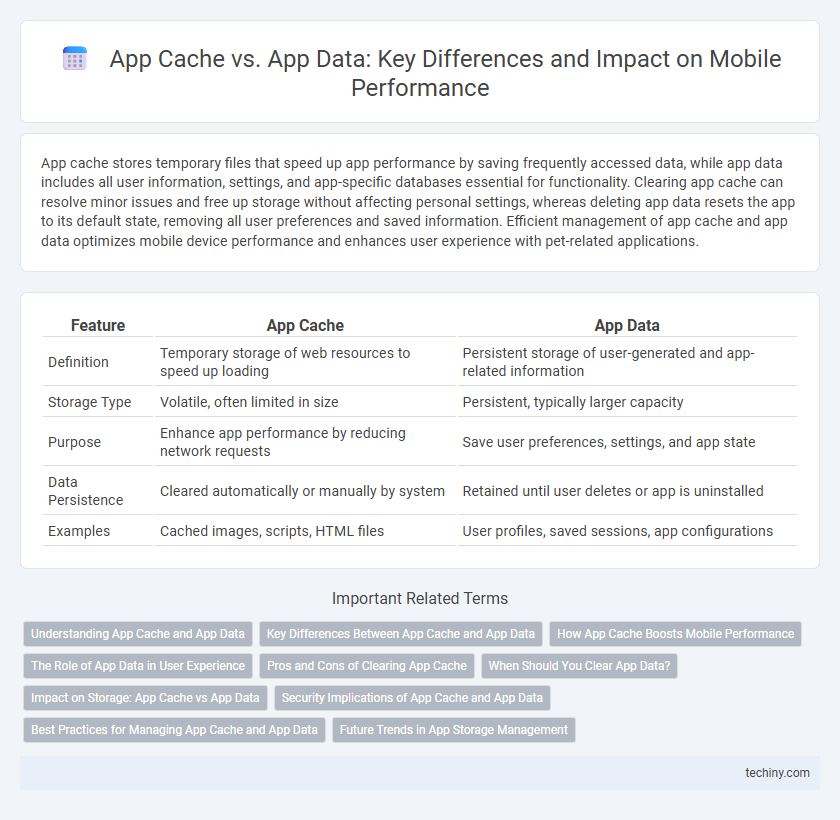App cache stores temporary files that speed up app performance by saving frequently accessed data, while app data includes all user information, settings, and app-specific databases essential for functionality. Clearing app cache can resolve minor issues and free up storage without affecting personal settings, whereas deleting app data resets the app to its default state, removing all user preferences and saved information. Efficient management of app cache and app data optimizes mobile device performance and enhances user experience with pet-related applications.
Table of Comparison
| Feature | App Cache | App Data |
|---|---|---|
| Definition | Temporary storage of web resources to speed up loading | Persistent storage of user-generated and app-related information |
| Storage Type | Volatile, often limited in size | Persistent, typically larger capacity |
| Purpose | Enhance app performance by reducing network requests | Save user preferences, settings, and app state |
| Data Persistence | Cleared automatically or manually by system | Retained until user deletes or app is uninstalled |
| Examples | Cached images, scripts, HTML files | User profiles, saved sessions, app configurations |
Understanding App Cache and App Data
App Cache stores temporary files that help mobile applications load faster by saving images, scripts, and other resources locally, reducing the need to fetch them repeatedly from the server. App Data consists of user-specific information such as preferences, login credentials, and settings, enabling personalized app experiences across sessions. Managing both app cache and app data effectively improves app performance and user experience while avoiding storage bloat on mobile devices.
Key Differences Between App Cache and App Data
App cache stores temporary files such as images and scripts to speed up app performance, while app data includes user-specific settings, preferences, and saved information essential for app functionality. Cache can be cleared without affecting app functionality, but deleting app data often resets the app to its default state, erasing personalized settings and saved progress. Managing app cache improves loading times, whereas controlling app data impacts overall app customization and user experience.
How App Cache Boosts Mobile Performance
App cache stores temporary files, such as images and scripts, allowing mobile apps to load faster by minimizing repeated data requests from servers. By reducing network latency and bandwidth usage, app cache significantly enhances the responsiveness and fluidity of user interactions. Efficient cache management optimizes memory usage, preventing slowdowns and improving overall mobile performance.
The Role of App Data in User Experience
App data stores personalized settings, user preferences, and game progress, playing a crucial role in tailoring the mobile experience to individual users. Unlike app cache, which temporarily saves files to speed up loading times, app data maintains long-term information that ensures continuity and customization. Efficient management of app data improves app responsiveness and user satisfaction by preserving essential information across sessions.
Pros and Cons of Clearing App Cache
Clearing app cache can free up storage space and resolve minor app performance issues caused by corrupted or outdated temporary files. However, it may lead to slower app loading times initially, as cached data must be rebuilt, and some user preferences might be temporarily reset. Unlike clearing app data, which removes all app settings and user information, clearing cache is less disruptive but only provides a short-term fix for storage and performance optimization.
When Should You Clear App Data?
Clearing app data is essential when an application exhibits persistent bugs, crashes frequently, or consumes excessive storage space due to accumulated data. Unlike app cache, which temporarily stores files to speed up performance, app data includes user settings, login information, and personal preferences that reset upon deletion. Users should clear app data to resolve severe app malfunctions or to reset the app to its original state when troubleshooting mobile devices.
Impact on Storage: App Cache vs App Data
App cache stores temporary files to speed up app performance, occupying less space but can accumulate rapidly, impacting storage efficiency. App data includes user-generated content and settings, consuming significant storage but essential for app functionality and personalized experiences. Managing both cache and data optimizes device storage, ensuring smooth app operation and preserving valuable user information.
Security Implications of App Cache and App Data
App Cache stores temporary files that can improve app performance but may expose sensitive information if accessed by malicious software, posing potential security risks. App Data contains critical user information and settings, making it a primary target for data breaches, requiring robust encryption and secure storage practices. Proper management of both App Cache and App Data is essential to safeguard against unauthorized access and ensure user privacy in mobile technology.
Best Practices for Managing App Cache and App Data
Efficient management of app cache and app data is crucial for optimizing mobile app performance and storage utilization. Developers should implement mechanisms to clear obsolete cache periodically while preserving essential app data to maintain user settings and preferences. Employing adaptive cache strategies based on device storage capacity and app usage patterns ensures both faster load times and a seamless user experience.
Future Trends in App Storage Management
App cache and app data management are evolving with the rise of AI-powered storage optimization and edge computing, enabling faster access and reduced latency. Future trends emphasize adaptive cache strategies that dynamically allocate storage based on user behavior and device context, improving performance without compromising privacy. Enhanced encryption and decentralized storage solutions will drive secure, efficient app storage management in next-generation mobile technology.
App Cache vs App Data Infographic

 techiny.com
techiny.com